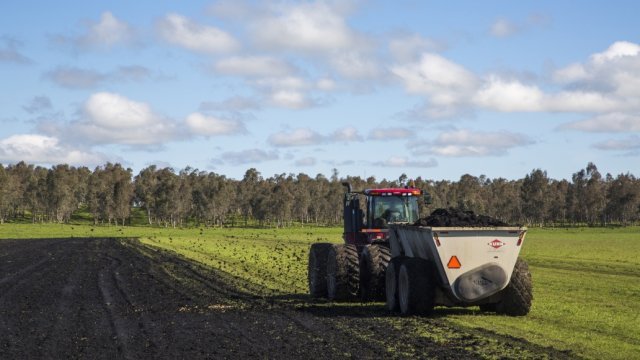While thought to be a low-cost fertilizer for farmers, the spread of biosolids on agricultural land within Orange County is leaving some residents concerned.
Biosolids or sewage sludge is produced by wastewater treatment plants during the process of removing contaminants. It’s treated to remove toxic contaminants before being dried and marketed to farmers by third-party companies as inexpensive fertilizer, including Synagro. Last week, the Department of Environmental Quality (DEQ) held a public hearing regarding Synagro’s application to renew its Orange County permit to apply biosolids on 2,564.9 acres of agricultural and silvicultural land at eight sites, 200 acres of which would be new land that isn’t included in the original permit. The original permit expires July 12, 2026. If renewed, it would be good for 10 more years. According to DEQ, “the permit authorizes the land application of biosolids and water treatment plant residuals as fertilizer on specific sites in the county and limits the application of nutrients, metals and pathogens contained in these materials to amounts that protect water quality and human health, in accordance with Virginia Pollution Abatement” regulations. However, the DEQ doesn’t include PFAs in their regulations.
Perfluoroalkyl and polyfluoroalkyl substances (PFAs) are man-made forever chemicals. According to ongoing research by the Environmental Protection Agency (EPA), exposure to PFAs may lead to adverse health outcomes. And they’re a major concern when it comes to biosolids.
Several concerned residents spoke during the public hearing on the application with many advocating for increased testing of biosolids. The hearing was initiated through a process in which at least 25 residents must request a hearing. Biosolids permit supervisor John Thompson said 62 written comments were received regarding the application, 59 of which requested a public hearing. The hearing was authorized Aug. 28.
Caleb Snyder of Synagro LLC said the company has been providing biosolids to Orange County farms for more than 36 years. He said the biosolids are rich in nutrients and provide essential nutrients for crop growth and help raise and maintain soil pH to ideal levels. The company is committed to advancing PFA legislation including the development of a testing protocol, Snyder said.
Biosolids are not currently tested for PFAs, nor are companies required to remove PFAs from them. According to Don McCowan of the Piedmont Environmental Council, 24 of the 38 sources Synagro will be getting its biosolids from have been identified as containing PFAs. These are mostly wastewater treatment plants which are tested for the presence of PFAs.
“We’re not here asking for a ban [on biosolids],” McCowan said during the public hearing, “but rather to urge the DEQ to address the known presence of PFAs in biosolids and ensure farmers are well informed. We believe farm families and neighbors have the right to know how much PFAs are in biosolids.”
Pam Jasty of Rapidan said she doesn’t object to biosolids, but does object to the lack of testing done on them. She said other states test biosolids for PFAs.
Dr. Richard Troast, an environmental consultant, said once biosolids dry after being applied, the PFAs will migrate in the air and water. They contaminate not only the property of farmers, but also other property, he said, noting that there aren’t any protocols to prevent particles from spreading.
District 5 Orange County Supervisor Bryan Nichol said he’s not against biosolids, but are against those containing PFAs being put on farmland in the county near surface water streams and rivers and near water recreation areas.
“[These chemicals] can cause significant harm to human health,” he said. “I had a constituent tell me this is essentially what lead was to my childhood to what kids have to deal with these days. We know these chemicals can reduce immune functions and can be extremely harmful to people and animals.”
Nichol requested the DEQ to require Synagro to test biosolids for PFAs prior to any application on Orange County land and to require those results to be reported to DEQ immediately and posted for citizens to view for the life of the permit. He also requested a prohibition on any biosolids being applied in the county that are found to contain PFAs.
“This will ensure the health and safety of Orange County residents, animals on farms, farmland and ensure drinking water is safe, protected and free from PFA contamination,” Nichol said.
Brian Hoffman of Barboursville, a member of Friends of the Rappahannock, said DEQ has the authority to ensure PFA-contaminated biosolids are not spread on farmland.
Bill Speiden of Somerset said to curtail PFAs, they need to be removed from items used everyday. PFAs are found within dozens of items and some companies have started working to remove them. Speiden said DuPont eliminated PFAs in 2021 from its firefighting foam, rain coats and other products. The brand 3M is currently working to remove them from its products as well. Speiden said instead of eliminating the use of biosolids, folks should let science and responsible companies minimize exposure issues. He said there are already numerous restrictions in place to ensure the safe application of biosolids to farmland.
The conversation regarding Synagro’s permit is ongoing. Written comments may be submitted until Nov. 7 to Stephanie Bowman, DEQ-BRRO, 901 Russell Drive, Salem, VA 24153 or stephanie.bowman@DEQ.Virginia.gov. Comment should reference application VPA00075 Synagro Central LLC-Orange County Reissuance.
Once the comment period closes, DEQ staff will prepare a summary of the comments and host a second public hearing for those who previously commented to respond to the summary. After that time, DEQ will decide to approve, deny or modify the permit application.
To view the permit application, visit https://www.deq.virginia.gov/news-info/shortcuts/public-notices/water/land-application-virginia-pollution-abatement-vpa.

